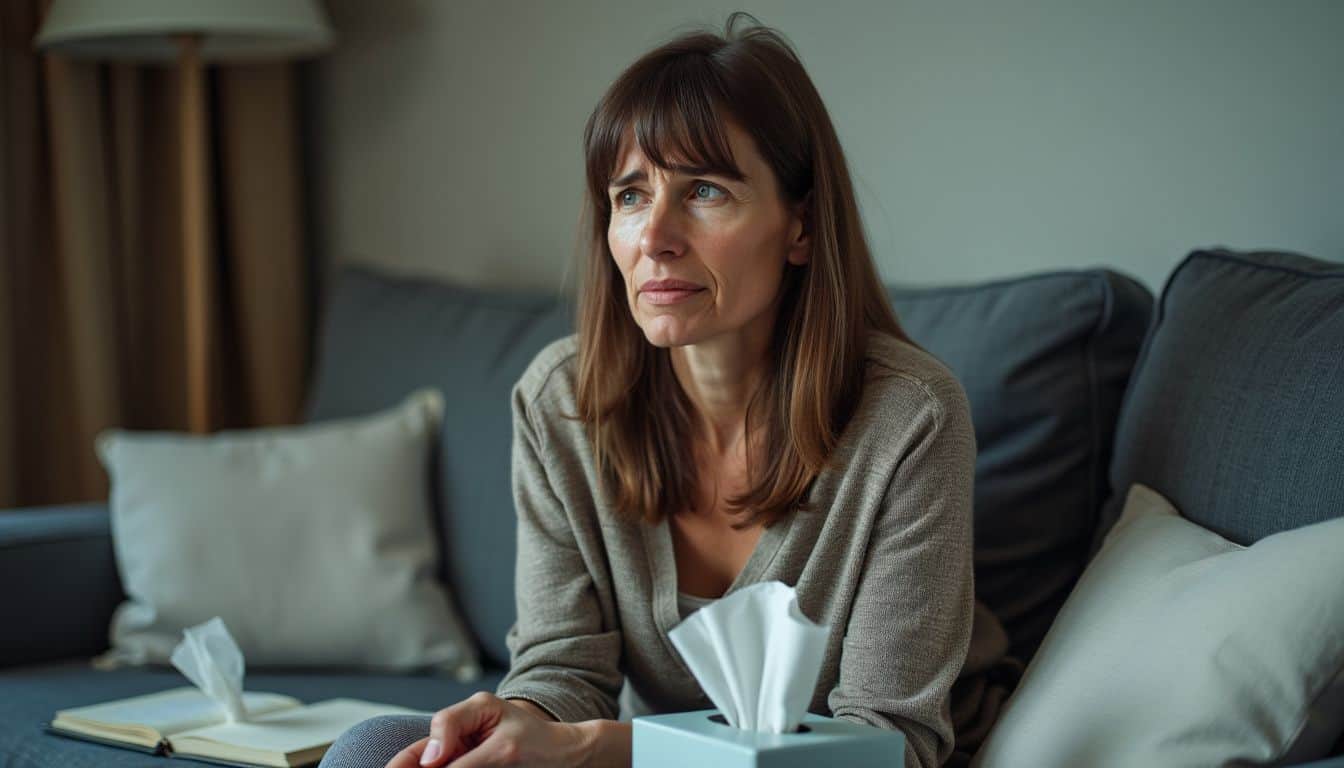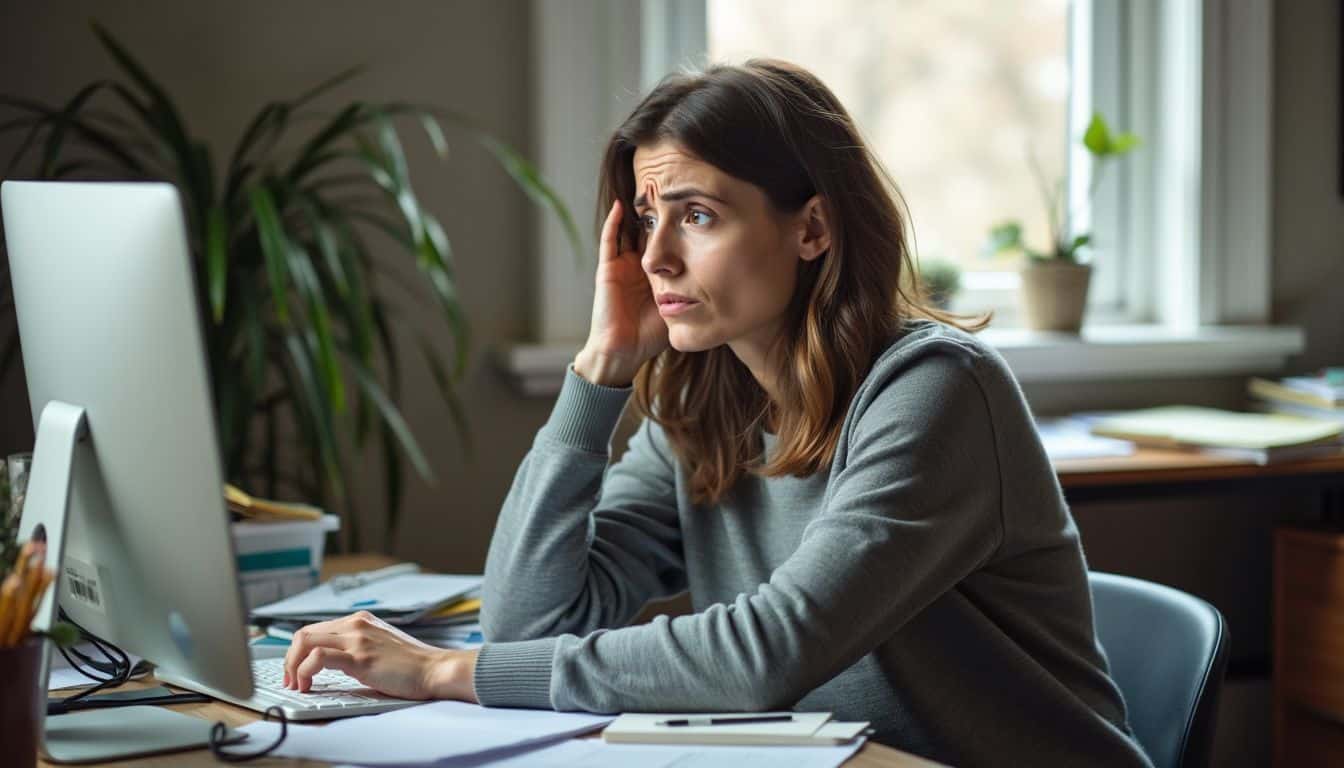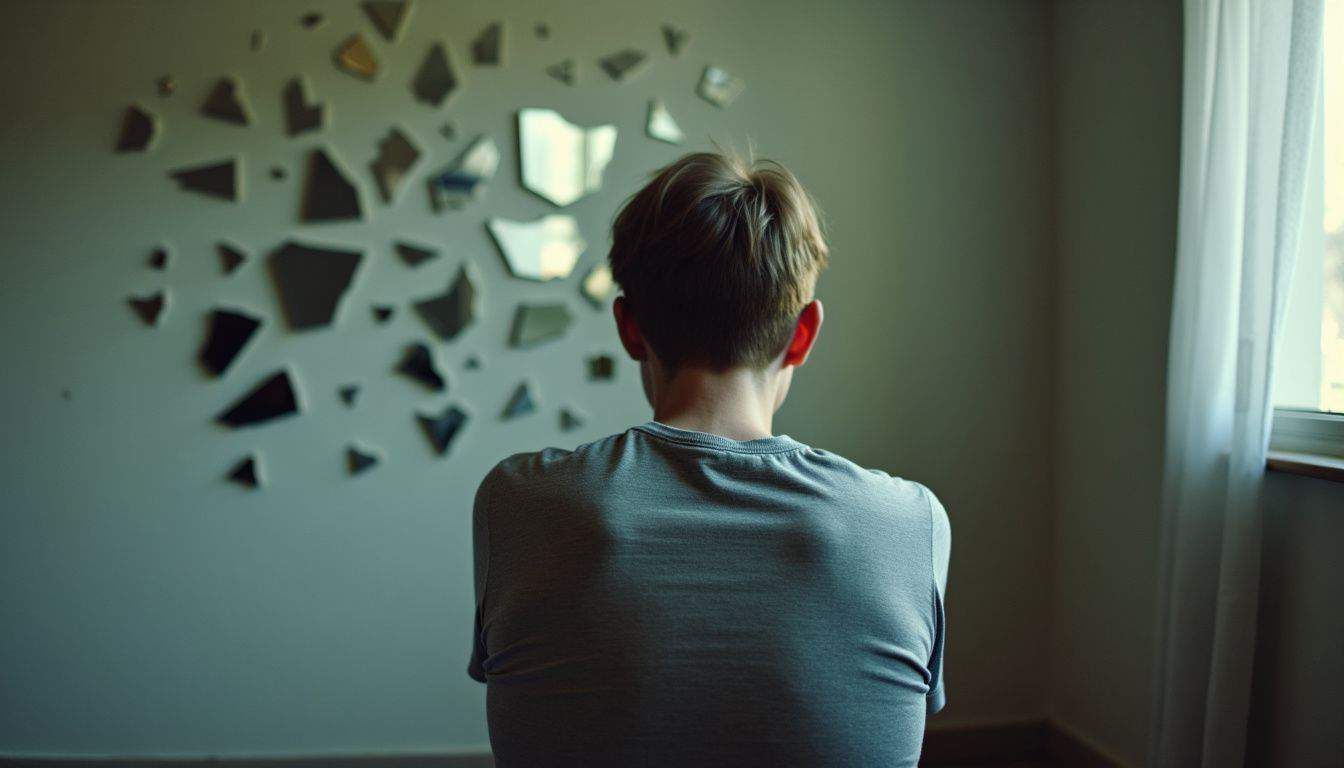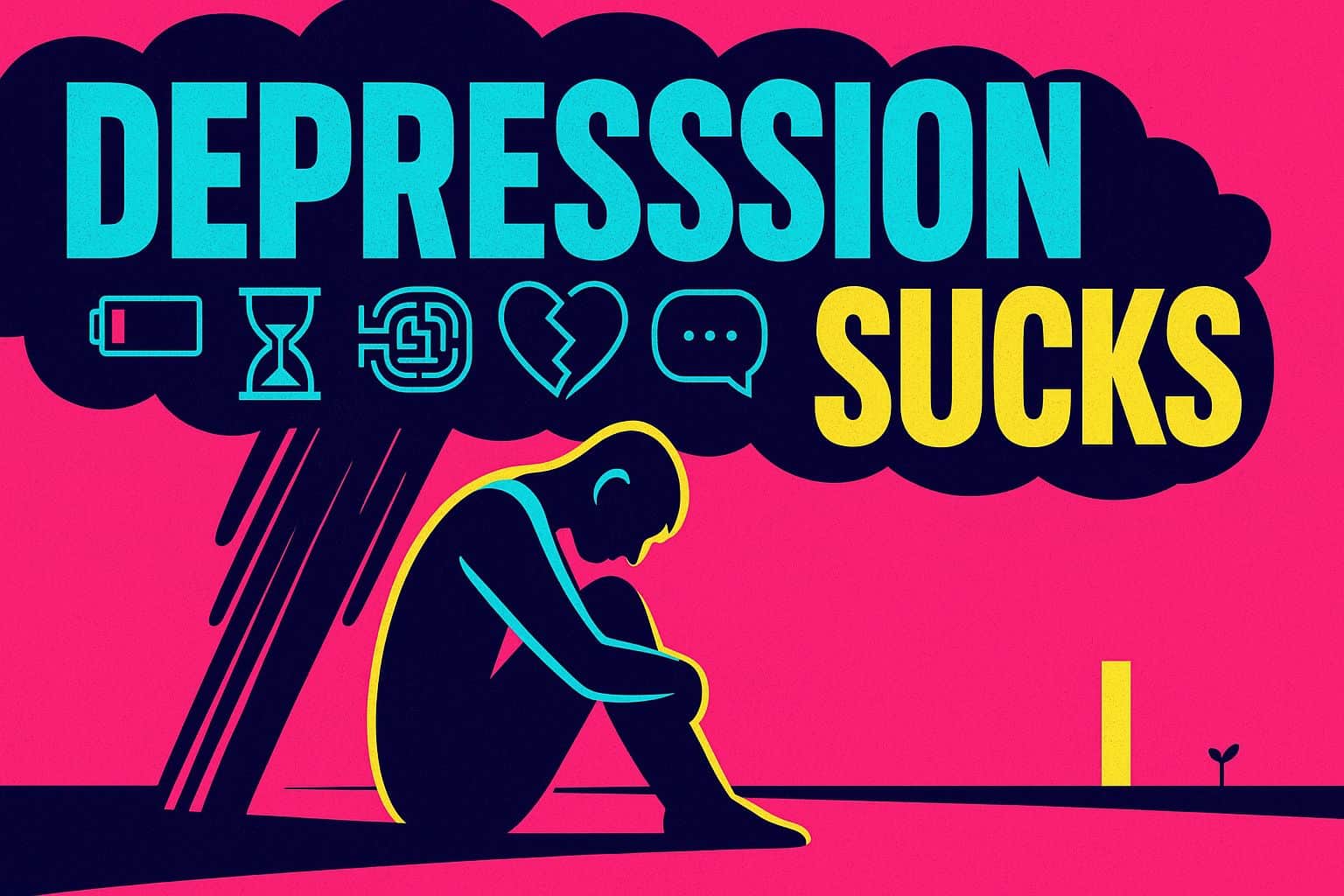Depression sucks. It’s like a heavy fog that clouds your mind, drains your energy, and steals your joy. And you’re not alone; globally, an estimated 5.7% of adults grapple with this every single day. But I want you to hear this loud and clear: you can fight back. You can reclaim your life from the fog.
Ready to learn some life-changing ways to manage depression?
Key Takeaways
Depression affects millions of people, especially women, and presents emotional, physical, and cognitive challenges.
Actionable strategies like building a daily routine, exercising, connecting with others, limiting social media, and finding new hobbies are proven ways to fight back.
Professional treatments such as Cognitive Behavioral Therapy (CBT), medication, and light therapy offer effective paths to recovery.
Simple self-help tools, including journaling and mindfulness apps like Calm or Headspace, can make a significant daily difference.
Building a strong support system through family, friends, and groups like those offered by NAMI (National Alliance on Mental Illness) is vital for recovery.
Table of Contents
Exploring the Emotional Experience of Depression

Depression is so much more than just feeling sad. It’s a deep, draining exhaustion that can make you feel completely isolated, like you’re trapped in a dark room with no way out.
Many women describe it as a constant battle. You might feel a persistent sense of worry, or a complete loss of interest in things that once brought you joy. This symptom even has a clinical name: anhedonia. It’s common to pull away from the people you love and criticize yourself for things that are out of your control.
On some days, just getting out of bed can feel like an impossible task.
But you are not fighting this alone. According to the World Health Organization, depression is about 1.5 times more common in women than in men. It is a real illness that deserves real care. The great news is that there is hope. Taking the first step, like trying online therapy, can make all the difference.
Asking for help is a sign of incredible strength. You’ve got this, one day at a time.
Identifying Key Symptoms of Depression

Depression shows up in many different ways. It isn’t just about feeling sad, it affects your body, your thoughts, and your emotions.
Emotional Changes

When you’re dealing with depression, your emotions can feel like they’re on a wild ride. One moment you might feel numb, and the next you could be overwhelmed by sadness. This is sometimes called “emotional dysregulation,” and it’s a core part of the experience.
It can feel like joy is a distant memory, replaced by a constant state of unease.
Feelings of guilt and worthlessness often join the party, whispering lies that you’re a burden or that nobody cares. These thoughts are symptoms of the illness, not reflections of reality.
Depression is like a heavy blanket. It weighs you down, but it’s not a part of you.
Physical Changes

Depression isn’t just in your head; it’s a full-body experience. Your appetite can go haywire, leading to either overeating or having no interest in food at all. Sleep often becomes a major struggle, leaving you exhausted whether you toss and turn all night or can’t seem to get out of bed.
Your energy completely vanishes. Simple, everyday tasks can feel as difficult as climbing a mountain.
- Unexplained Aches: You might feel persistent body aches, as if you’re constantly carrying a heavy weight.
- Weight Fluctuations: It’s common to gain or lose weight without any change in your diet or routine.
- Low Libido: Your sex drive can plummet, as depression often zaps your desire for intimacy.
These physical symptoms are important signals that something is wrong and needs attention.
Cognitive Challenges

Depression can create a thick “brain fog” that makes it incredibly hard to think clearly. You might find yourself unable to focus at work, or you may struggle to follow a conversation. This isn’t a personal failing; it’s a real neurological symptom.
This is often referred to as “executive dysfunction,” and it disrupts your brain’s ability to plan, organize, and regulate emotions. It can make simple decisions feel overwhelming and cause problems with short-term memory. Recognizing this as a symptom is the first step toward clearing the fog.
Challenges Faced by Those with Depression

Living with depression means fighting an invisible battle every day. One of the biggest hurdles isn’t the illness itself, but how the world reacts to it. People often don’t understand, saying things like, “Just cheer up!” which only makes things harder.
Confronting Social Stigma

The social stigma around mental health is a heavy weight, often making you feel ashamed or weak for something you can’t control. This lack of understanding is a major reason why many people hesitate to get the help they need.
Organizations are working to change this. The National Alliance on Mental Illness (NAMI) runs a StigmaFree campaign to shift perceptions and create a more supportive culture. When we talk openly about mental health, it chips away at the stigma.
Every conversation matters. When we treat mental illness with the same seriousness as a physical illness, like diabetes or heart disease, we make it easier for people to seek care. The more we talk, the less power stigma holds.
The stigma surrounding depression delays vital care and leads to individuals coping without seeking help.
Addressing Misunderstandings About Its Seriousness

Depression isn’t a bad mood you can “snap out of.” It’s a serious medical condition that disrupts brain chemistry and can make daily life feel impossible.
Tragically, depression is a leading cause of disability worldwide and is closely linked to suicide, which is the third leading cause of death for people aged 15-29. This highlights how crucial it is to take this illness seriously.
Despite the risks, over half of people with mental illness don’t get help, often because they fear judgment. Sharing accurate information and personal stories is one of the most powerful ways to fight this misunderstanding. When people understand how serious depression is, it empowers more individuals to seek the life-saving help they deserve.
Effective Strategies to Manage Depression

While depression can feel overwhelming, you have the power to fight back. Let’s explore some simple yet powerful strategies you can start using today to manage your symptoms and reclaim your joy.
Establishing a Daily Routine
When your world feels chaotic, a daily routine can be an anchor. It provides structure and predictability, which can be incredibly calming for a mind struggling with depression.
Start small by waking up and going to bed around the same time each day. A consistent sleep schedule is fundamental to managing your mood.
A great insider tip from online support communities is the “non-zero day” concept. The goal is to do just one small thing, no matter how minor, to move forward. This could be making your bed, taking a shower, or washing one dish. It helps break the cycle of inertia.
To help you stay on track, consider using a habit-tracking app like Streaks or Habitica. They turn building routines into a game, which can make it feel more manageable and rewarding.
Incorporating Physical Activity
Moving your body is one of the most effective ways to combat depression. Exercise releases endorphins and boosts serotonin, your brain’s natural mood-lifters.
Research from Harvard Health has shown that for mild to moderate depression, exercise can be as effective as antidepressants. Just 15 minutes of running or an hour of walking per day can reduce the risk of a major depressive episode by 26%.
You don’t have to become a marathon runner. Any movement counts. Try having a quick dance party in your living room (because we all love dancing), taking a brisk walk, or trying a yoga video on YouTube. Find an activity you genuinely enjoy, and you’ll be more likely to stick with it.
Exercise is a celebration of what your body can do. Not a punishment for what you ate.
Building Connections with Others
Depression thrives in isolation. Building and maintaining connections with others is a powerful antidote.
In a 2023 advisory, the U.S. Surgeon General highlighted loneliness as a major public health crisis. Making an effort to connect is vital for your mental well-being. This could be as simple as scheduling a weekly phone call with a friend or joining a local book club.
If you’re looking for new ways to meet people, consider volunteering for a cause you care about. Websites like VolunteerMatch can connect you with opportunities in your area. Shared experiences build powerful bonds.
Never hesitate to lean on your support system. Asking for help is a sign of strength.
Reducing Social Media Exposure
Social media often presents a distorted version of reality, a constant stream of everyone else’s highlight reels. This can fuel feelings of inadequacy and loneliness.
A landmark 2018 study revealed that limiting social media use to just 30 minutes per day can significantly improve well-being and reduce feelings of depression. More recent studies continue to confirm the strong link between high social media use and poor mental health.
Try setting a timer or using your phone’s built-in wellness features to monitor your usage. Deleting apps from your phone for a weekend can also be a refreshing reset. You’ll be surprised at how much better you feel when you’re not constantly comparing your life to others.
Exploring New Hobbies
When depression steals your interest in old activities, exploring new, fun hobbies can help you rediscover a sense of purpose and joy.
A hobby can help you achieve a “flow state,” a term psychologists use to describe being completely absorbed in an activity. This state is incredibly beneficial for mental health, as it quiets anxious thoughts and provides a sense of accomplishment.
Not sure where to start? Platforms like Skillshare and Coursera offer thousands of online classes on everything from watercolor painting to coding. The goal isn’t to be perfect; it’s to enjoy the process of learning something new.
Professional Treatment Options for Depression

While self-help strategies are powerful, sometimes you need professional support to break through the fog. Let’s look at some of the most effective treatment options available.
Exploring Therapy Options
Therapy, or talk therapy, is a cornerstone of depression treatment. It’s a collaborative effort between you and a trained professional to identify and change thought patterns and behaviors that contribute to your depression.
There are many different types of therapy, but two of the most effective and well-researched for depression are Cognitive Behavioral Therapy (CBT) and Interpersonal Therapy (IPT). Finding the right fit is key, and online platforms like BetterHelp and Talkspace have made it easier than ever to connect with a therapist.
| Therapy Type | What It Is | Best For You If… |
|---|---|---|
| Cognitive Behavioral Therapy (CBT) | Focuses on identifying and changing negative thought patterns and behaviors. It’s structured and goal-oriented. | You want practical, hands-on strategies to challenge your thoughts and change your actions. |
| Interpersonal Therapy (IPT) | Focuses on improving your relationships and social functioning to relieve depressive symptoms. | You feel your depression is linked to grief, relationship conflicts, or major life changes. |
One specific form, Mindfulness-Based Cognitive Therapy (MBCT), has been shown to cut the risk of relapse in half for people with a history of recurrent depression.
Considering Medication
For many people, medication can be a life-changing tool. Antidepressants work by balancing neurotransmitters, the brain’s chemical messengers that affect mood and emotions.
The most commonly prescribed medications are Selective Serotonin Reuptake Inhibitors (SSRIs), which include drugs like Prozac and Zoloft. They are effective for many, but it’s important to know that it can take 4 to 8 weeks to feel the full effects.
Finding the right medication and dosage often requires some trial and error. A 2021 study that analyzed millions of tweets found that side effects can vary widely from person to person. Working closely with your doctor and being open about your experience is crucial to finding the best fit for you.
Utilizing Light Therapy
If your depression gets worse during the darker winter months, you might be experiencing Seasonal Affective Disorder (SAD). Light therapy can be an incredibly effective treatment for this.
This therapy involves sitting in front of a special light box for about 20-30 minutes each morning. These boxes mimic natural sunlight and help regulate your body’s internal clock.
For the therapy to be effective, experts recommend using a lamp that provides an intensity of 10,000 lux and filters out most UV light. Well-regarded brands like Verilux HappyLight and Carex Day-Light offer models that meet these clinical standards. Always talk to your doctor before starting light therapy to make sure it’s a safe option for you.
Self-Help Techniques for Depression

In addition to professional treatment, there are powerful self-help tools you can use every day to manage your symptoms and build resilience.
Maintaining a Journal
Journaling is like having a confidential conversation with yourself. It’s a safe place to untangle your thoughts and process your feelings without any fear of judgment.
A structured approach you might like is the “Morning Pages” practice from Julia Cameron’s book, “The Artist’s Way.” It involves writing three pages of stream-of-consciousness thoughts first thing in the morning to clear your mind.
You can also use prompts to guide you. For example, try an “emotional weather report,” where you describe your current feelings as a type of weather. This creative exercise can help you understand your emotional state in a new way.
Looking back at old entries can also be a powerful reminder of how far you’ve come, like finding an old photo and seeing your own strength.
Practicing Meditation and Mindfulness
Mindfulness is the practice of paying attention to the present moment without judgment. It helps you observe your negative thoughts without getting swept away by them.
Research consistently shows that mindfulness is a powerful tool against depression. A major meta-analysis found that Mindfulness-Based Cognitive Therapy (MBCT) can reduce the risk of depressive relapse by 31% compared to usual care.
You don’t need any special equipment to get started. Apps like Calm and Headspace offer thousands of guided meditations, including short 5-minute sessions that are perfect for beginners. Even a few minutes a day can make a big difference.
The key is consistency. By practicing regularly, you train your brain to be less reactive to stress and negative thoughts, building a foundation for lasting mental well-being.
The Role of Support Systems in Overcoming Depression

Depression can make you feel utterly alone, but you don’t have to carry this weight by yourself. Your friends, family, and community can be a powerful lifeline.
Engaging Family and Friends
Your loved ones can be your greatest allies. Often, they are the first to notice that something is wrong. Reaching out to them can feel hard, but it’s a crucial step.
Sometimes, they may not know how to help. You can guide them by being specific. Try saying something like, “I’ve been really struggling lately. Could we schedule a short phone call once a week, just to check in?” This gives them a clear, actionable way to support you. Don’t forget to celebrate the small wins with them, too.
There are also resources to help your family learn. Programs like the Family Navigation and Support Program (FNSP) teach loved ones how to create a supportive home environment, which is essential for recovery.
Participating in Support Groups
Support groups offer something unique: a community of people who truly understand what you’re going through. It’s a space where you can share your experiences without fear of judgment.
Leading national organizations provide free, peer-led support groups both online and in person. This makes them incredibly accessible, no matter where you live.
- NAMI (National Alliance on Mental Illness): Offers “NAMI Connection,” a recovery support group for adults with mental health conditions. They have chapters all over the country.
- DBSA (Depression and Bipolar Support Alliance): Provides groups for people living with depression and bipolar disorder, offering a place for connection and encouragement.
Joining a group can help you feel less isolated, learn new coping strategies, and build lasting friendships. It’s a powerful reminder that you are not alone in this fight.
People Also Ask
How can I tell if I’m dealing with depression or just feeling blue?
Feeling blue is temporary, but depression is a persistent feeling of sadness, hopelessness, or emptiness that lasts for at least two weeks. A key sign of depression is losing interest in activities you once enjoyed, a symptom known as anhedonia. If these feelings interfere with your daily life, it’s time to talk to a doctor.
What are some quick ways to boost my mood when I’m feeling down?
Try stepping outside for a 15-minute walk. Sunlight and exercise are proven mood boosters. You can also try a guided meditation using an app like Calm or Headspace to ground yourself. Calling a friend to connect with someone who cares can also make a big difference.
How can therapy help with depression?
Therapy, especially Cognitive Behavioral Therapy (CBT), gives you a toolbox for your mind. A therapist helps you identify and challenge the negative thought patterns that fuel depression. It’s like having a coach who helps you rewire your brain for healthier thinking and coping skills.
Are there any natural remedies that can help with depression?
While not a replacement for professional treatment, many lifestyle changes can help. Regular exercise is as effective as medication for some people. A balanced diet and consistent sleep are also crucial. Some people find supplements like St. John’s Wort helpful, but you must talk to your doctor first, as it can interact with other medications.
How do I help a loved one who’s battling depression?
The most important thing is to listen without judgment. Don’t try to “fix” them. Instead, say things like, “I’m here for you,” and ask how you can help. Encourage them to seek professional help and offer to assist with making appointments or driving them there. Also, remember to take care of your own mental health.
Is medication always necessary for treating depression?
Not always. For mild to moderate depression, therapy and lifestyle changes are often very effective on their own. For more severe depression, a combination of medication and therapy is typically the most effective treatment. A doctor or psychiatrist can help determine the best course of action for your specific situation.



